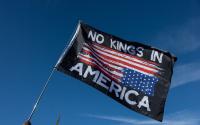Common Dreams/ Published on Monday, December 17, 2007 by the Philadelphia Inquirer Chris Hedges
The release of the National Intelligence Estimate concerning Iran’s nuclear status marks the latest in a series of assaults by the Pentagon and the intelligence community against the war posturing of the Bush administration.
President Bush, seven years after assuming power, may finally be halted in his tracks - not by a resurgent Democratic opposition, sagging opinion polls, or an organized antiwar movement, but by the entrenched power structure in Washington he set out to emasculate. The tug-of-war between those within the administration who advocate as many as 1,000 air strikes on suspected Iranian nuclear facilities and those who oppose an attack will be the most dramatic battle of the final Bush years.
Director of Central Intelligence Gen. Michael V. Hayden and Defense Secretary Robert M. Gates have turned out to be formidable foes to the Bush agenda of preemptive war in the Middle East. Gates, along with Adm. William Fallon, commander of U.S. Central Command, and Gen. George Casey, the Army’s new chief of staff, are openly opposed to a war with Iran. And they will not, unlike their predecessors, permit the Bush White House to use cooked and fabricated intelligence to whip the country into war frenzy.
The effort by the vice president’s office to change or suppress the NIE report, which was ready during the summer and stated that Iran had halted its attempt to develop nuclear weapons four years ago, has consumed the internal mechanisms of government for the last few weeks. The existence of the report did nothing to prevent either Bush or Vice President Cheney from asserting before it was made public that Iran was working to develop a nuclear weapon and could trigger, in the president’s words, “World War III.”
Bush called on Iran on Tuesday to explain why it had a secretive nuclear-weapons program, and he warned that “for the sake of world peace,” no such efforts should be allowed to flourish.
“Iran is dangerous,” Bush said after an Oval Office meeting with Italian President Giorgio Napolitano. “We believe Iran had a secret military-weapons program, and Iran must explain to the world why they had such a program.”
Israeli Prime Minister Ehud Olmert is also determined to prevent Iran from developing facilities that could produce a nuclear weapon. And Olmert insists Bush is on board, even if top U.S. generals and intelligence officials are not.
Repeatedly during Bush’s presidency, the Israeli government, with strong backing from the White House, has turned to force rather than diplomacy to further Israeli interests in the Middle East. Israel unleashed a disastrous bombing campaign against Lebanon last year. This Sept. 6 it carried out air strikes against a Syrian facility that it said was meant to develop nuclear material. Israel has quarantined the 1.4 million Palestinians in the Gaza Strip and imposed draconian cuts in electricity and fuel. During the Bush years, the effort to negotiate a solution to the Palestinian conflict has never gone beyond the photo opportunities that characterized the charade in Annapolis, Md. Israel, like Washington, prefers to speak to its adversaries in the language of violence. A strike on Iran fits neatly into this pattern.
“At the beginning of the month, as you know, the National Intelligence Council of the United States published its updated estimation of Iran’s intentions and capabilities in the nuclear field,” Olmert told the Israeli Institute for National Security Studies on Tuesday. “I attribute great importance to the declaration by the president of the United States, George Bush, that nothing has changed; Iran was and remains dangerous, and we must continue the international pressure with full force to dissuade Iran from its nuclear tendencies. I trust and am confident that the United States will continue to lead the international campaign to stop the development of a nuclear Iran.”
White House lawyers conceivably could use the 2001 congressional authorization to use military force against Afghanistan and the 2002 authorization to use force against Iraq to justify an attack on Iran without going back to Congress for approval. The 2001 resolution gave the president the right to use force against the perpetrators of the Sept. 11, 2001, attacks and anyone who “harbored such organizations or persons.” The 2002 resolution handed the president the power to defend the country against “the continuing threat posed by Iraq.”
The allegations that Iran is involved in supporting and arming insurgents in Iraq, along with the designation of the Iranian Revolutionary Guard as a terrorist organization, could be twisted by White House lawyers to legitimize air strikes against Iran.
“This unexpected bump in the road has, in my opinion, stimulated the Bush administration to develop its own new rationale to justify what will in effect be a full-speed-ahead continuation of past and present policy toward Iran, almost as if the NIE issue had never intervened,” said Ray Close, a retired Middle East specialist for the CIA.
The Bush White House has tried to use the report to assert that Iran remains intent on acquiring nuclear weapons and is a threat.
“Convinced that they have been viciously sabotaged by a partisan anti-Bush intelligence community, and desperate to justify the basic philosophy and doctrine that underlies their specific policies, these people are painfully wounded and thus in a dangerous frame of mind,” Close said. “With hopes for a strengthened international sanctions regime fading, and no reasonable excuse available for launching an early preventive military attack, but with their pride deeply injured and their nerves sandpapered raw, I would not be surprised at all to see a heightened level of provocative and threatening rhetoric emanating from the White House in the months ahead.”
The covert operations taking place in Iran, if they are stepped up, could provoke retaliatory acts by Iran against U.S. personnel or facilities in Iraq or the Gulf. Any action by Iran deemed by the Bush White House to be hostile to the United States or Israel could, Close argues, be instantly seized upon by the president to carry out air strikes against Iran. This could ignite a deadly chain reaction.
“I think the publication of this NIE, rather than cooling the atmosphere, as many analysts predict,” Close warned, “is actually going to lead to a more dangerous and unstable situation in the region in the months and years ahead.”
Chris Hedges, who graduated from Harvard Divinity School and was for nearly two decades a foreign correspondent for The New York Times, is the author of “American Fascists: The Christian Right and the War on America.“






